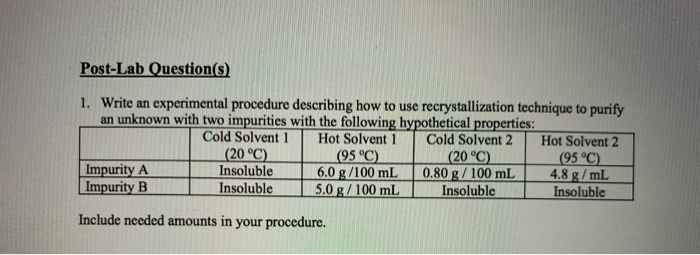Post-Lab Question(s) 1. Write an experimental procedure describing how to use recrystallization technique to purify an unknown with two impurities with the following hypothetical properties: Cold Solvent 1 (20 °C) Insoluble Insoluble Hot Solvent 1 (95 °C) 6.0 g /100 mL 5.0 g/ 100 mL Cold Solvent 2 Hot Solvent 2 |Impurity A |Impurity B (20 °C) 0.80 g/ 100 mL Insoluble (95 °C) 4.8 g/ mL Insoluble Include needed amounts in your procedure.
Post-Lab Question(s) 1. Write an experimental procedure describing how to use recrystallization technique to purify an unknown with two impurities with the following hypothetical properties: Cold Solvent 1 (20 °C) Insoluble Insoluble Hot Solvent 1 (95 °C) 6.0 g /100 mL 5.0 g/ 100 mL Cold Solvent 2 Hot Solvent 2 |Impurity A |Impurity B (20 °C) 0.80 g/ 100 mL Insoluble (95 °C) 4.8 g/ mL Insoluble Include needed amounts in your procedure.
Principles of Instrumental Analysis
7th Edition
ISBN:9781305577213
Author:Douglas A. Skoog, F. James Holler, Stanley R. Crouch
Publisher:Douglas A. Skoog, F. James Holler, Stanley R. Crouch
Chapter33: Automated Methods Of Analysis
Section: Chapter Questions
Problem 33.8QAP
Related questions
Question
Post-Lab question: write an experimental procedure describing how to use recrystallization technique to purify an unknown w/ 2 impurities with the following hypothetical properties:

Transcribed Image Text:Post-Lab Question(s)
1. Write an experimental procedure describing how to use recrystallization technique to purify
an unknown with two impurities with the following hypothetical properties:
Cold Solvent 1
(20 °C)
Insoluble
Insoluble
Hot Solvent 1
(95 °C)
6.0 g /100 mL
5.0 g/ 100 mL
Cold Solvent 2
Hot Solvent 2
|Impurity A
|Impurity B
(20 °C)
0.80 g/ 100 mL
Insoluble
(95 °C)
4.8 g/ mL
Insoluble
Include needed amounts in your procedure.
Expert Solution
This question has been solved!
Explore an expertly crafted, step-by-step solution for a thorough understanding of key concepts.
This is a popular solution!
Trending now
This is a popular solution!
Step by step
Solved in 2 steps

Knowledge Booster
Learn more about
Need a deep-dive on the concept behind this application? Look no further. Learn more about this topic, chemistry and related others by exploring similar questions and additional content below.Recommended textbooks for you

Principles of Instrumental Analysis
Chemistry
ISBN:
9781305577213
Author:
Douglas A. Skoog, F. James Holler, Stanley R. Crouch
Publisher:
Cengage Learning

EBK A SMALL SCALE APPROACH TO ORGANIC L
Chemistry
ISBN:
9781305446021
Author:
Lampman
Publisher:
CENGAGE LEARNING - CONSIGNMENT

Principles of Instrumental Analysis
Chemistry
ISBN:
9781305577213
Author:
Douglas A. Skoog, F. James Holler, Stanley R. Crouch
Publisher:
Cengage Learning

EBK A SMALL SCALE APPROACH TO ORGANIC L
Chemistry
ISBN:
9781305446021
Author:
Lampman
Publisher:
CENGAGE LEARNING - CONSIGNMENT